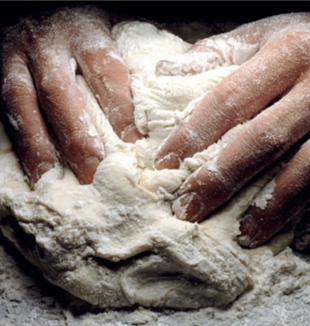
Hands in the Dough
Randy left a job in finance to take over a traditional bakery in Texas with his wife Lucy. Now he has two stores, places “to live together the fulness of the things we do.”From the May issue of Traces
Do you know what a kolache is? It is a round cake of dough with flavored butter filled with various things, usually fruit, but also cheese or poppy seeds. Kolaches are common in the Czech Republic, and they arrived in Eastern Texas with the immigrants in the 1800s. Randy Hines was born in these areas of Texas, which have been renamed the “Czech Belt.” In Houston, you can find these treats at the Kolache Shoppe, a traditional bakery opened on Richmond Avenue in 1970 by a man named Erwin Ahrens and today owned by Randy and Lucy Hines.
Randy comes from the Czech Belt and his grandma used to make him kolaches. He began working in 2001 as an auditor for Deloitte. Then, after four years, he moved to Valero Energy, in the oil and gas sector. “But I was restless. I wanted to do something different but I didn’t know what,” he recalls. In 2005 he decided to resign and go to Washington, DC, to study at the John Paul II Institute. It was there that he met Lucy. But he also met the rector of the Institute, professor David Schindler. “I remember that his wish for many of us students was that we would return to the heart of the world as lawyers, businessmen, entrepreneurs…” At the end of his studies, Randy went back to his role as an auditor in Texas. But, missing the sweets his grandma used to make, he went with Lucy to meet Erwin Ahrens and asked him to teach him the recipe of his famous kolaches. It was the beginning of a friendship that, in 2013, led the elderly baker to offer them his business: the two accepted and, without any experience, or hardly any, became in one go entrepreneurs and bakers.
The first years were very difficult. Randy woke up in the middle of the night to make the dough and get it in the oven. He went from two kids to seven and, when he went back to work, the house was a mess of toys, homework, snacks, and dirty diapers. He opened a new shop (now made into its own franchise) and employed thirty people. It was not possible just to wipe the flour off his hands and his face and leave work behind. His thoughts followed him at every hour. Randy never forgot the words of professor Schindler: “Christ has something to do with all of this.”
“During my theology studies I read a few books by Giussani and I remember that for him the point was the seriousness with which you take all of life,” says Randy: “To be serious with the rules of the game, which make you respect the laws of the State and of the market, but also the laws of your own humanity.” For the baker-theologian, what changed the way he worked was the idea of fulfillment, which placed itself at the origin of the decision to be made. “Wall Street has its idea of prosperity. Hollywood has another. The halls of power in Washington have another one still. With faith, happiness is something else and that makes all the difference…”
Randy and Lucy’s employees have quite a different background from them. “If someone comes to work with us, he recognizes that there is something different, and we hope that he asks himself what makes this difference possible. We simply say ‘sorry’ if we mess up, we say ‘thank you,’ we ask ‘how was your weekend?’, we make difficult decisions when they have to be made, we make sacrifices if someone is in need. We want each person to have the possibility of a balanced life and of realizing themselves. On Sundays we stay closed, even if this makes us earn less. Have we always done everything right? Absolutely not. But we never stop trying.”
Does being Christian at work just mean being kind or generous? “No, we are not do-gooders,” Randy explains, “also because a business like ours cannot stay afloat like that.” So, with some things he does not joke around. “What we say to our employees, in an explicit or implicit way, is that we are together. The effort in the work is inevitable. God said to Adam: ‘You will earn your bread by the sweat of your brow.’ And when someone complains and would like to give up, I respond: ‘I am sorry but it isn’t possible. It is hard for me too, but we can face it together. I will do everything so that you, in the midst of this weight that cannot be avoided, can discover that you are doing something useful for yourself and for others.’” But why is it worth it, if it is easier just to go through life without any problems? “Jesus says in the Gospel: ‘I came that they may have life and have it in abundance.’ And this fullness is promised to us now, within the things we are doing. The game is worth it.”